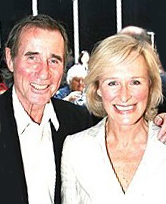A Quote by Jim Dale
The joy about the recording is that you are your own boss. You don't have a director telling you how to do it.
Related Quotes
I was interested in the ways we can write biography. When you're first starting to write about your own life it feels so shapeless because you don't know how to make your own story cohesive. How do I pluck a story out of the entirety of what it means to be alive. It occurred to me recently that when you're telling a story about your own life, rather than taking a chunk, you're kinda like lifting a thread from a loom.
I've had friends who have come away who've said, "I shouldn't have become such close friends with the director." You always want to get on with the director, but I personally prefer a relationship where you respect them - you get on really well with them, but they're boss, as it were. It's about trusting your director, for better or for worse. They're the one's seeing what's coming out on the monitors, so you have to try and trust what they say.
I am working in my office. I've got a boss who tells me what to do. He's got a boss who tells him what to do. And above him is another boss who probably is telling my boss in the same way - or my boss' boss in the same way what to do. In actuality, this is not the way things work. Management science says that that kind of a chain doesn't work more than three levels up.
Happiness is a state of non-contradictory joy--a joy without penalty or guilt, a joy that does not clash with any of your values and does not work for your own destruction, not the joy of escaping from your mind, but of using your mind's fullest power, not the joy of faking reality, but of achieving values that are real, not the joy of a drunkard, but of a producer.




































